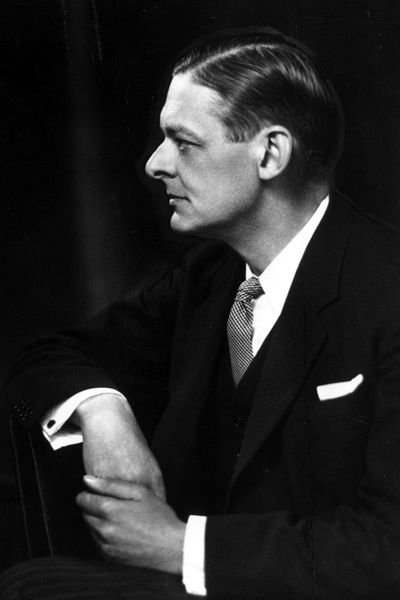The contending versions of T.S. Eliot on display in the latest bumper instalment of his collected letters are practically legion. To begin with there is the hieratic, if not downright priestly, Eliot, soberly petitioning Father D’Arcy, the correspondence columns of the Church Times, or studious clergymen who may be flattered into taking charge of his pet project for a library of 17th-century theological classics. Next there is the sedulous Elizabethan scholar gravely conferring with Professor Grierson over textual complications in Marlowe, and circulating the results around the Cambridge combination rooms.
Then comes a third Eliot, the deferential protégé of elderly men-of-letters such as Charles Whibley or J.M. Robertson, who had helped him at crucial moments in his career, and on whom flattering encomia are heaped as with a trowel. But there is a fourth Eliot, the doting family man, writing to his elderly mother with details of General Haig’s funeral or assuring his Aunt Susie that her enjoyment of his poem gave him great pleasure. And possibly even a fifth — a slightly (but only slightly) unbuttoned variant on numbers one to four, unloading rather arch fragments of locker-room ribaldry on such frat-house convives as Ezra Pound (‘Dear Rabbit’) and Bonamy (‘Buggary’) Dobree.
Finally, and most conspicuously, there is Eliot the editor. He worries himself sick about the Criterion’s reconfiguration into a quarterly, now that Lady Rothermere has withdrawn her largesse, and briskly talent-spots ‘a short play by a boy called Auden whom I have seen and talked to several times’. He nervously balances his desire that the magazine’s contributors should not be corralled into a ‘school’ with his urge to appease subscribers who lament the lack of procedural unity. And all this is to ignore the volume’s default setting, as it were, which is Eliot the turner-down of invitations to lecture college essay clubs and learned societies. If it were possible to run a software check on the book’s most characteristic phrase, it would undoubtedly be ‘I very much regret…’
The chief interest of last year’s Letters, Volume 3, 1926-1927 was its focus on Eliot the combative literary man-about-town. If the English literary scene of the late 1920s sometimes resembles a kind of endless guerrilla warfare, then Eliot — Sitwells to the left of him, Bloomsbury to the right, with the traditionalists of the London Mercury stealing up vengefully in the rear — was perfectly able to look after himself. Volume 4 adds further choice details to this portrait, as well as offering scenes from Eliot’s disintegrating marriage (Vivien now returned to the marital nest but having to be kept under wraps), and evidence of his occasional tendency to tartness.
Every so often there comes a moment when his habitual solemnity, the exquisite editorial courtesy and that almost paralysing eagerness to be polite to people, peels away. The decision to bury Hardy’s heart in Dorchester is one such: marked down as ‘curio hunting… Why not divide him joint by joint and spot him round the country?’ As for Lady Gerald Wellesley, capricious patron of the Hogarth Press, ‘I have seen her once, and once is enough.’ No disrespect to John Haffenden and the late Mrs Eliot’s Herculean labours in Queen Square, but one could have done with more of this.
John Hayward (1905-1965) makes his first appearance in July 1928, wanting to discuss his forthcoming Nonesuch Press edition of Donne. By the following January Eliot — sounding rather like Lord Chesterfield — is recommending him to Professor Grierson as ‘a young friend of mine, in whom I take a great deal of interest’. After walk-on parts in half-a-dozen literary biographies of the era, Hayward deserved a life of his own, and John Smart’s elaborate chronicle does him proud. A doctor’s son from Wimbledon, confined to a wheelchair after the onset of muscular dystrophy, Hayward was an odd fish altogether. He was on the one hand a fastidious independent scholar of a kind that has all but disappeared from English literary life; on the other a frustrated ladies’ man with an acid tongue, not above once instructing undergraduettes who brought their poems round for criticism to take their clothes off on the spot.
To charm, courtesy and punctiliousness Hayward added a pronounced domineering streak and considerable powers of persuasion: Eliot’s decision to flat-share with him in Carlyle Mansions, Chelsea, in 1946 followed a 12-year lobbying campaign. Health in irreversible decline, comments on Eliot’s work less gratefully received than in the salad days of the Four Quartets, Hayward suffered the devastating snub of being cut out of his hero’s life at a stroke, when Eliot — giving his friend two days’ warning — marched up the aisle with his secretary, Miss Valerie Fletcher, in January 1957. As Smart shows, there was far more to Hayward, editor, literary freelance and all-round cultural haute fonctionnaire, than his attendance on Possum. On the other hand, some of the best bits of Tarantula’s Web take in the sheer grotesquerie of their relationship. Osbert Lancaster was once watching a circus process across Battersea Park when Hayward’s wheelchair, pushed by Eliot, suddenly appeared at the end of the line. According to Lancaster, this looked exactly like ‘the final promenading spectacle of the show’.





Comments